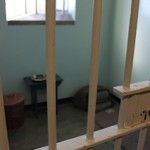Robben Island – Even Freedom Comes With A Price…
 We file like a herd of dazed cattle from the ferry into the crowded bus, and then from the bus through the cool corridors and out into the dusty, hot courtyard. As soon as we step into the brilliant sunshine, I see him. His toque pulled low over his ears, a faded brown wool sweater across his chest, and threadbare jeans hanging from his narrow frame. I wonder how he can dress so warmly in this heat. As he waits for everyone to file in, he looks down at his boots and I hear the grinding of a rock beneath his foot.
We file like a herd of dazed cattle from the ferry into the crowded bus, and then from the bus through the cool corridors and out into the dusty, hot courtyard. As soon as we step into the brilliant sunshine, I see him. His toque pulled low over his ears, a faded brown wool sweater across his chest, and threadbare jeans hanging from his narrow frame. I wonder how he can dress so warmly in this heat. As he waits for everyone to file in, he looks down at his boots and I hear the grinding of a rock beneath his foot.
When he finally speaks, I have to lean in to catch his hushed words. A former political prisoner, he used to live behind the bars of this prison on Robben Island. With his slow monotone, he introduces us to the island using such well-oiled words that I’m sure he has said them a thousand times before. When he finally motions for us to follow him into the building, he warns us to stay close, so that we don’t get lost in the prison’s twists and turns.
 We walk in behind the restless throng of people and stop for the 1.8 seconds allotted to take a photo of Nelson Mandela’s former cell before we have to push onwards; the crowd behind us wants their chance to capture an image of the tiny space where Mandela spent much of his 27 years in captivity.
We walk in behind the restless throng of people and stop for the 1.8 seconds allotted to take a photo of Nelson Mandela’s former cell before we have to push onwards; the crowd behind us wants their chance to capture an image of the tiny space where Mandela spent much of his 27 years in captivity.
As our group surges past cell after cell of barred doors, I wonder how it felt to hear the sound of these locks closing as you settled in for another endless night, imprisoned for fighting for your freedom, but with no idea of how or when you would ever actually be free.
After getting lost because we stopped for too long to take photos (he wasn’t kidding about every corridor of the prisoner looking the same as the last), our guide finds us wandering through a courtyard outside a block of cells and shepherds us into a communal prison cell to finish the tour. When he has all of us assembled, he says in the same monotone that we can ask him anything we like about his life as a prisoner on Robben Island.
After a round of generic questions, a young girl finally raises her hand and timidly asks the question on most of our minds. “What it is like for you to come back every day to the place where you were imprisoned in order to give these guided tours?”
He says in a soft, but firm voice, “In order for a man to live, he needs to eat. In order to eat, he needs to work.”
I can’t imagine how painful it is to come back every day to the prison that stole your youth from you. When he tells us that he arrived at the age of 24 and left at the age of 35, I quickly do the math. My lower jaw drops when I realize that the man before me is only in his early 50s when he looks so much closer to 70.
When asked how the 11 years he spent behind bars affected him, he simply said, “It was difficult, but we survived.”




Comment (1)
Incredibly humbling experience to visit Robben Island. Thanks for the reminder.